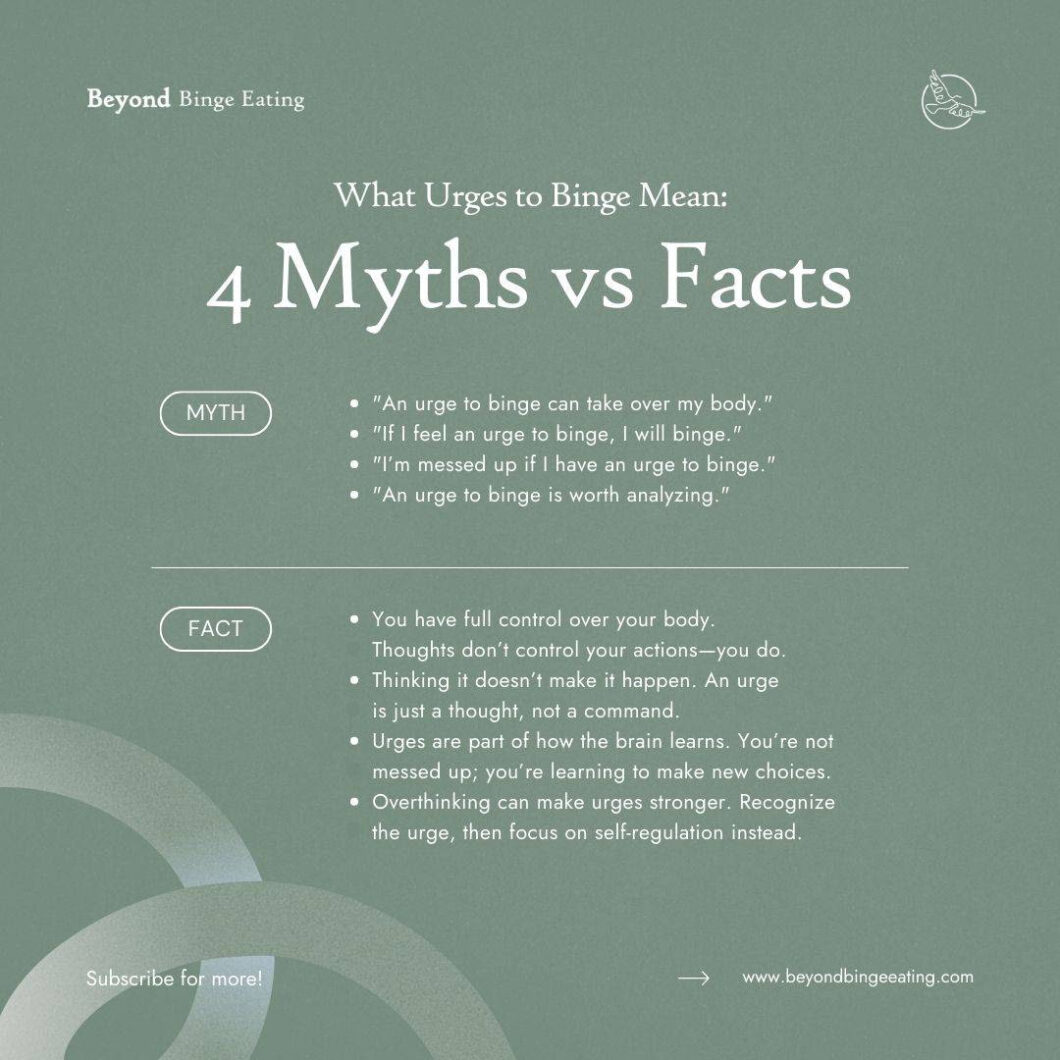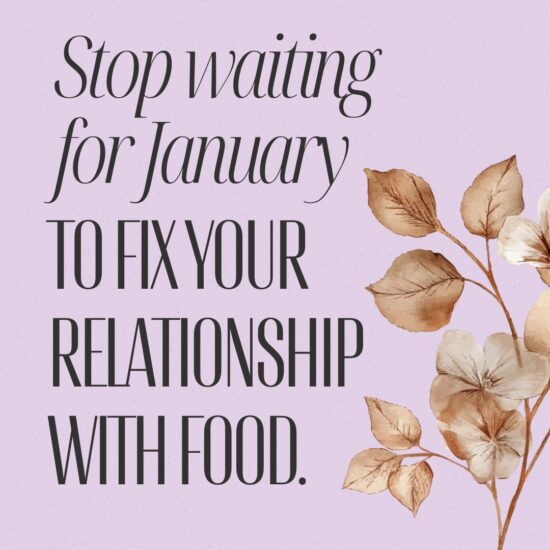If you’re struggling to control binge eating urges when they hit, I want you to know you’re not alone. I’ve been there, and so have many of my clients. The good news? Understanding what’s really happening with these urges can completely transform your relationship with them.
In this article, I’m sharing the four biggest myths about binge urges that I see trip people up in their recovery journey. These are the exact insights that have helped my clients break free from the binge cycle.
The Truth About Urges Changes Everything
I’ve seen it time and again in my coaching practice: when you understand what’s actually happening in your brain during an urge, everything shifts.
These misconceptions about urges keep so many people stuck. But once you see through them? That’s when real freedom becomes possible.
This new understanding helps both in those tough moments and over the long term. Each time you respond differently to an urge, you’re literally rewiring your brain.
Myth #1: “Urges Can Take Over Your Body”
Have you ever caught yourself thinking, “I couldn’t help it – the urge just took over”? I hear this from new clients all the time, and it makes controlling binge eating urges seem impossible.
Fact: You Always Have Choice
Here’s what I want you to know: no urge can physically control your body. A thought about binging doesn’t have the power to move your hands to the fridge.
Think about it this way – when you think about texting a friend, does your phone magically appear in your hand? Of course not! The same is true for binge thoughts.
This separation between thoughts and actions is key. While urges feel overwhelming, they’re just thoughts passing through.
I’ve watched this realization transform my clients’ relationship with food. No matter how intense an urge feels, you can observe it without having to act on it.
Myth #2: “If I Feel an Urge, I’m Going to Binge”
Another belief I often help clients work through is that urges somehow predict what you’ll do next.
Fact: Urges Don’t Determine Your Actions
Psychologists call this “Thought-Action Fusion” – the mistaken belief that having a thought makes the action more likely.
We all have random thoughts all day long. You might think “I could text my ex right now” – but that doesn’t mean you will or even want to! The same applies to binge urges.
When you truly understand this, you can experience urges without the fear and panic. You can simply note, “There’s that urge again. I see it, but I don’t need to follow it.”
I’ve watched clients break free from years of binge patterns by practicing this simple shift. Each time you let an urge pass without binging, you’re building a new pathway in your brain.
Myth #3: “Something’s Wrong With Me for Having These Urges”
The shame that comes with urges can be just as painful as the urges themselves. Many clients come to me wondering, “Why do I keep having these thoughts? What’s wrong with me?”
Fact: Your Brain Is Working Perfectly
Here’s what I share in all my coaching sessions: urges are evidence that your brain is functioning exactly as designed. Your brain learns from rewards and seeks them again. If binging provided comfort or relief before, your brain developed urges to repeat it.
These urges show your brain has learned too well, not that you’re broken. This is simply how our reward system works.
Bringing compassion to yourself changes everything. Rather than judging yourself, you can recognize urges as a normal part of recovery. Everyone breaking any habit experiences urges – you’re not alone in this.
This shift from judgment to compassion creates the space you need to heal. (I share more about self-compassion in recovery on our About page.)
Myth #4: “I Need to Figure Out Why I’m Having This Urge”
When urges strike, it’s tempting to analyze: “Why now? What triggered it? What does this mean about my recovery?”
Fact: Simple Awareness Works Better
What I’ve found most effective with my clients is simple awareness without deep analysis. Over-analyzing can actually make controlling binge eating urges harder rather than easier.
A gentler approach is to briefly notice the urge (“I’m experiencing an urge right now”), then redirect your attention. This simple acknowledgment is surprisingly powerful.
In my coaching sessions, I teach practical strategies that work better than analysis:
- Take five slow breaths
- Sip cool water mindfully
- Hold an ice cube or smell a favorite essential oil
- Reach out to someone supportive
- Step outside for fresh air
You can find more of my favorite strategies on our Free Recovery Resources page.
5 Approaches to Control Binge Eating Urges
Now that you understand what urges really are, here are five practical approaches I teach my clients:
1. Practice Urge Surfing
I love teaching this technique! When an urge appears, see it as a wave that rises and falls. Don’t fight it or give in. Just watch with curiosity as it peaks and eventually fades away.
2. Develop Mindful Awareness
Mindful eating transforms your relationship with food in ways that continue to amaze me. My Eat-With-Awareness Bundle gives you free tools to build this skill.
3. Build Distress Tolerance
Often, urges come during emotional discomfort. Learning to sit with uncomfortable feelings without turning to food is a game-changer for binge recovery.
4. Create Your Personal Urge Plan
In my coaching sessions, we create a personalized plan for what you’ll do when urges strike. Having this plan makes responding to urges so much easier in those challenging moments.
5. Connect With Support
This journey doesn’t have to be solo. Working with someone who understands binge eating recovery can make all the difference. The Conscious Bites Self-Paced Online Course is a self-paced, 6-module experiential program for women in recovery who are still binging and are ready to break the shame spiral, rebuild trust with food, and feel truly free.
Your Journey to Control Binge Eating Urges Starts Here
To wrap up, responding effectively to urges starts with these four key truths:
- Urges cannot control your actions
- Feeling an urge doesn’t mean you’ll binge
- Having urges means your brain is working normally
- Simple awareness works better than deep analysis
Recovery isn’t about eliminating urges – it’s about changing how you respond to them. With practice, you can experience urges without acting on them.
Remember that recovery is a journey, not a perfect straight line. Each time you navigate an urge differently, you’re literally rewiring your brain for freedom.
Ready to take the next step? Get the Conscious Bites Self-Paced Online Course or subscribe to my Recovery Newsletter for regular support.
Have questions about your binge recovery journey? I’m here to help! Contact me or check out the Beyond Binge Eating Podcast for more guidance.




